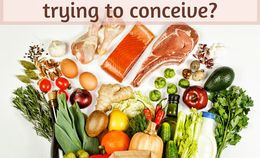Did you know that your menstrual cycle is considered the fifth vital sign?
That is because it is a complex, very accurate and sensitive dance of hormones and if there is something going on in the body, immediately the cycle will react and give you signals. That is cool, right?🤩
Although everybody talks about 28 day cycle, only 15% of women experience that each month, and a completely normal cycle is considered to be between 21 - 35 days long.
The same goes with ovulation: rarely women ovulate on Day 14, and they can either experience it before or after that day since this stage is highly influenced by stress, illness, travel, quality of sleep, etc.
When women experience cycles longer than 35 days on a regular basis, then most of the times they've been diagnosed with PCOS hypothalamicamenorrhea or they've just got off the hormonal birth control.
Having a shorter cycle (less than 21 days) is also a sign of things now going well and most of the time is related to either the body not being able to ovulate or the body didn't produce enough progesterone in the second half of the cycle to keep the endometrium in place.
With every cycle, your body works to produce an egg capable of being fertilized, and the conditions necessary to nurture it for the duration of pregnancy.
But that is not the only role of your hormones! They have an effect also in our mood, our energy production, our curves, and overall health.
Although the reproductive system has more than a dozen hormones, today we'll review which are the six most important:
1️⃣ Follicle Stimulating Hormone (FSH) is produced by the pituitary gland and is meant to send signals to the ovaries to initiate the development of a select few follicles each cycle.
2️⃣ Luteinizing Hormone (LH) is produced as well by the pituitary gland and is responsible for both stimulating and completing follicular growth (with FSH), as well as the luteinization of the ruptured follicle in order to transform it into a corpus luteum following ovulation. LH is best know for the “LH surge” which is that dramatic increase that serves as the trigger to ovulation☄️
3️⃣ Estrogen is produced by the follicles that develop within the ovaries as you progress from menstruation to ovulation. Each cycle, it’s responsible for maturing eggs and the uterine lining as well as developing a wet, fertile cervical fluid as you aproach ovulation.
4️⃣ Progesterone is the heat producing hormone produced by the corpus luteum, following ovulation.🥚
It’s the hormone most responsible for nurturing and maintaining the endometrium in the post-ovulatiry phase.
5️⃣ Gonadotropin Releasing Hormone (GnRH) is the hormone produced by the hypothalamus which sends signals to the pituitary gland to increase production of FSH and LH
6️⃣ Testosterone is produced partly by the ovaries and the rest in adrenal glands. Its main function is to regulate a woman’s sex drive but also helps women preserve muscle mass and supports an overall sense of wellbeing. The combination of testosterone and estrogen can increase a woman’s libido considerably during ovulation and even menstruation.
Follicular Phase
If you're a woman probably you have noticed that how you feel in the first couple of days of your cycle is not the same as mid-cycle or end. It's not a coincidence, it's all caused by your hormones.
The woman's cycle is broken in three phases: Follicular, Ovulation and Luteal.
Today I will tell you more about the follicular phase and what happens with your body and your hormones.
The Follicular phase is the first one and starts with the period, ends right before ovulation and usually lasts 12-14 days.
During this time your body prepares for ovulation.
When the period begins, day 1 of your cycle, all the hormones are low. That is why you may feel tired and lethargic.
That is normal since your body is working hard to shed the endometrium lining and prepare the body for ovulation and possible implantation of the fertilized egg.
Now that the major hormones (Estrogen and Progesterone) are low, the hypothalamus secretes Gonadotropin Releasing Hormone (GnRH) which signals to the pituitary gland to release FSH and initiates the follicular growth in the ovary. A large number of follicles will be recruited to develop and mature, but only one will be selected to become an egg.
While developing, these follicles are producing Estrogen (and Testosterone), which will stimulate the uterine lining to develop but your also starting to feel more energetic and excited to do new things.
While Estrogen levels increases, the cervical fluid changes (from lotion to egg white consistency), creating a fertile environment for the eventual visit by the sperm.
Ovulation
Ovulation is the second stage in women's cycle after the follicular phase when one follicle from the bunch matures and get chosen to releases an egg in the scope of fertilization.
The way it works is when Estrogen levels reach a certain level ⬆️ the GnRH is triggered and sends another signal to the pituitary to increase the LH and FSH production⬆️, which will normally trigger the release of the egg.
Once ovulation occurs, FSH and LH drop.
No women ovulates the same, not even from cycle to cycle. So believing that every woman should ovulate on day 14 is a complete myth.
Ovulation is influenced by outside factors, like how much and how well you've been sleeping, if you've been going through some stressful days, how much you've been eating, if you've been traveling, if you are sick, etc.
The body wants to find the best opportunity to release the egg and if it senses that you're in danger, you're highly stressed, don't have enough food, etc., it will postpone ovulation until things are safe.
We can’t tell precisely when ovulation happens but there are two ways to identify the fertile window:
1️⃣ Ovulation predictor kits (OPKs) that are paper strips that you pee on them and will identify the LH surge. It is considered that ovulation will happen within 36hours after LH surge.
2️⃣ Fertility Awareness Method/Symthothermale Method where you identify when your body produces fertile cervical fluid (that's the fertile window) and confirm that ovulation happened with the basal body temperature shift
Unfortunately with women who have #PCOS the OPKs can give false positive since LH is constantly elevated throughout the cycle and it won't have room to rise in order to set the start to ovulation.
Luteal phase
And here we are, at the last phase of the cycle!
Following the release of the egg from the ovary, the follicle that held the egg collapses in itself, becoming the corpus luteum.
The corpus luteum starts to release Progesterone and has a lifespan of about 12-16 days.
The luteal phase is constant, in comparison to the other two, because the corpus luteum being well established on the ovarial wall, it's unaffected by the stress of every day life, like the developing follicles are.
Progesterone that is produced by the corpus luteum plays a huge role in women's health and fertility:
✅ Prevents the release of other eggs for the rest of the cycle
✅ Thickens the uterine lining and keeps it from shedding so the embryo can implant in on the uterine wall
✅ Causes the three primary fertility signs to change: cervical fluid to dry, waking temperatures to rise and closes the cervix so no sperm will be able to enter the uterus
Progesterone is essential even if you don't want to get pregnant.
Progesterone's job is also to counter the effects of Estrogen and makes you feel calm, chilled out and in love with your life.
If you ever feel irritable, sleepless, anxious or weepy before your period that is a sign that you're not getting enough Progesterone or you reproducing way more Estrogen in comparison with Progesterone.
The easiest way to identify if you have low Progesterone is my tracking your cycle and basal body temperature.
Also you can confirm with a hormone test run by your doctor, naturopath or functional medicine doctor.
Note: Since Progesterone is produced only on certain days, the timing is also important for testing. The recommended time is 5-7 days after ovulation. If you’re testing outside that time window you will get false results.
If you want to know how you can optimize your cycle for your wellbeing or future pregnancy, enroll on my on-line one-on-one coaching program and you get all the tools to succeed.















